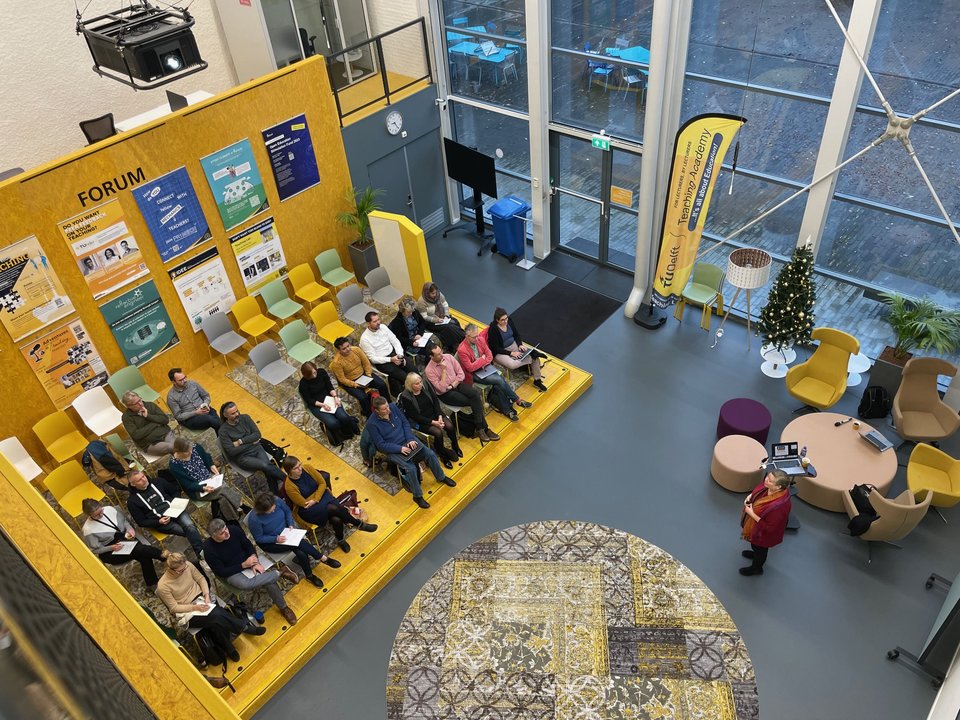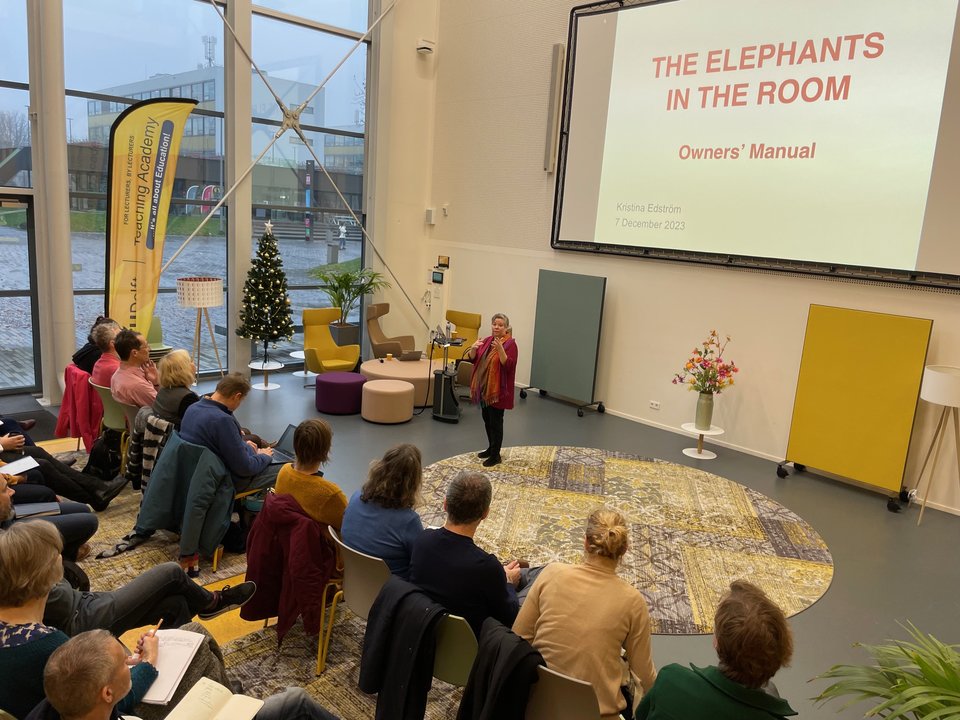Newly appointed Professor of Innovation in Engineering Education joins IDEE as theme teams take shape
Following the successful launch of the first educational innovation project teams, the Initiative on Innovation in Delft Engineering Education (IDEE) recently announced another exciting development. Appointed as IDEE’s Engineering Education Scientific Expert, Professor Kristina Edström brings experience and direction to the unique programme that is taking shape. She and Annoesjka Cabo, Academic Director of the TU Delft Teaching Academy, sat down to discuss the progress of the theme teams and shared their plans for educating the engineers of the future.

Team building
After announcing their groundbreaking initiative earlier this year, IDEE issued a call for participants to start building the theme teams. These teams will focus on innovation projects related to one of three themes: Students taking responsibility for their own learning process; Retention of knowledge and skills; and Future engineering skills. Initially they had hoped to have a couple of people from different faculties to form each of the teams, so Annoesjka said they were pleasantly surprised when 60 enthusiastic people responded. “We were looking for people motivated to do research and innovation on educational projects that could devote 20 percent of their time, so that was really something,” she said.
In the Fall of 2023, the theme teams began to take shape. Team members come from all TU Delft faculties and include different backgrounds spanning scientific and educational researchers, learning developers and educational advisors. They were invited to write a project proposal based on one of the three broad challenges. These proposals were then submitted to the IDEE board for feedback, which helped to narrow the focus for each project.
Leading with experience
From the start, there were plans to bring an Engineering Education Scientific Expert on board to help assure the scientific quality of IDEE. With 25 years of experience in developing engineering education, Dr. Kristina Edström was recently appointed to the post. Having met Kristina years ago when she came to visit TU Delft, Annoesjka said: “She gave a keynote presentation that impressed me, so when I started thinking about who this external scientific expert could be, it was a clear choice.”
Since 1997, Kristina has been working on educational development at KTH Royal Institute of Technology in Stockholm, Sweden. She will retain her KTH position as Associate Professor in Engineering Education Development, while devoting 20 percent of her time to IDEE. In her new role as full professor within TU Delft, Kristina will be part of the Delft Institute of Applied Mathematics (DIAM) at the EEMCS faculty. She is an active member of SEFI, the European Society for Engineering Education and since 2018, she has been the Editor-in-Chief of the European Journal of Engineering Education, published by SEFI. As evidenced by her experience, Kristina said: “My identity and my mission is very much to improve engineering education.”

Support system
One of the next steps for IDEE is bringing researchers on board for the theme teams, one PhD candidates and two postdoctoral researchers for each team. “When Annoesjka told me about IDEE almost a year and a half ago, I thought it was ingenious to have faculty working with PhD students and postdocs to really mobilise around an education project,” Kristina said. “I think the presence of PhD students and postdocs shows the level of ambition of this initiative.” In her new role, she will be working with all the teams, but giving special consideration to the PhD students and postdocs. “I will support the faculty members who are engaging, and especially support these young researchers when it comes to knowledge, research, and publishing,” she said. “I hope to help them find their feet in the field of engineering education.”
Part of that task will be guiding PhD students to the networks they need. Luckily, there's a great European community with SEFI, Kristina said. “We have quite a wonderful network of both senior people in the field and PhD students that I think the IDEE PhD students are going to love to be a part of.” Although the PhDs will be connected to a TU Delft faculty, she is hoping to help make them part of the larger European and global research community.
Opportunity for impact
In her experience, Kristina said she has not seen this level of commitment or investment by any university for a project like this. In addition to the PhD students and postdocs, the fact that the projects will be given five years means there can be impact on education and practice. “That means you have time to try iterations and you can really make things work,” she said. “You can also develop as a person quite a lot in five years so I think those conditions are better than anything else I've ever heard of.” Kristina said she wants people to succeed in their local contexts, and feel part of something greater. “I want to strengthen the community and I think it’s important that people see their own part in this endeavour as a whole.”
IDEE is also creating an opportunity for faculty members to have an impact on education. “It shows that we have different career paths now in academia,” said Annoesjka. What she has heard so far from the faculty members involved is that they already feel recognised by getting the chance to do something like this. “These researchers also have their own lives and careers, so how can we make the world visible to them and how can the world see them? Being from outside is an important aspect of what Kristina can bring here,” she said.
Developing role models
Because the Netherlands is rethinking the academic career with regards to rewards and recognition, Kristina believes this is the perfect time and place for IDEE. “In my view, this endeavour is also about creating a generation of people who have a much stronger capacity and merits on the educational side. They will be pioneers,” she said. “What does it mean to have education be such a core part of your career? And those PhD students and the postdocs and many of the faculty who are gathered around this, I think of them as budding role models in the new view on what academic careers can be.”
Educating for the future
Referencing something TU Delft’s Vice Rector Rob Mudde said, Kristina noted that IDEE is about education, but it's also about educating ourselves. “It's about making sure that we develop into something that the university and society needs,” she noted. “I think that's very important because a lot of people think we're going to have a change project, win hee're simply going to change what we do. But we can't change what we do unless we also, at the same time, change who we are. So if we think that we are going to stay the same, we're just going to do things a little differently, we are mistaking ourselves.” Adding to that, Annoesjka said: “We cannot change the education for the engineer of the future if we do not change ourselves or the whole environment that we're working in.”
That ambitious and innovative approach is the driving force carrying IDEE forward. Active recruitment for PhDs and postdocs for the existing theme teams has begun, but there is more to come. In 2024, IDEE will start formulating two additional teams, incorporating two new themes to the initiative. For anyone interested in progress on the projects as well as up to date information on opportunities to get involved, keep an eye on the IDEE website.